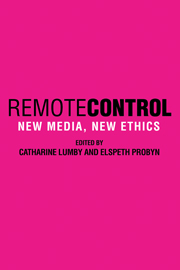Book contents
- Frontmatter
- Contents
- List of Contributors
- Acknowledgements
- 1 Introduction: An Ethics of Engagement
- 2 Real Appeal: The Ethics of Reality TV
- 3 Arguing about Ethics
- 4 ‘Their own media in their own language’
- Beyond the Disconnect: Practical Ethics
- 5 A Viable Ethics: Journalists and the ‘Ethnic Question’
- 6 Ethics, Entertainment and the Tabloid: The Case of Talkback Radio in Australia
- Money versus Ethics
- 7 Eating into Ethics: Passion, Food and Journalism
- Beyond Food Porn
- 8 Ethics impossible? Advertising and the Infomercial
- Pitching to the ‘Tribes’: New Ad Techniques
- 9 Diary of a Webdiarist: Ethics Goes Online
- 10 Control-SHIFT: Censorship and the Internet
- Representing the Asylum Seekers
- 11 The Ethics of Porn on the Net
- Ethics and Sex
- 12 Grassroots Ethics: The Case of Souths versus News Corporation
- 13 Great Pretenders: Ethics and the Rise of Pranksterism
- The Limits of Satire
- Index
10 - Control-SHIFT: Censorship and the Internet
Published online by Cambridge University Press: 18 December 2009
- Frontmatter
- Contents
- List of Contributors
- Acknowledgements
- 1 Introduction: An Ethics of Engagement
- 2 Real Appeal: The Ethics of Reality TV
- 3 Arguing about Ethics
- 4 ‘Their own media in their own language’
- Beyond the Disconnect: Practical Ethics
- 5 A Viable Ethics: Journalists and the ‘Ethnic Question’
- 6 Ethics, Entertainment and the Tabloid: The Case of Talkback Radio in Australia
- Money versus Ethics
- 7 Eating into Ethics: Passion, Food and Journalism
- Beyond Food Porn
- 8 Ethics impossible? Advertising and the Infomercial
- Pitching to the ‘Tribes’: New Ad Techniques
- 9 Diary of a Webdiarist: Ethics Goes Online
- 10 Control-SHIFT: Censorship and the Internet
- Representing the Asylum Seekers
- 11 The Ethics of Porn on the Net
- Ethics and Sex
- 12 Grassroots Ethics: The Case of Souths versus News Corporation
- 13 Great Pretenders: Ethics and the Rise of Pranksterism
- The Limits of Satire
- Index
Summary
JOSEPH GUTNICK IS A WEALTHY, MELBOURNE-BASED BUSINESSMAN. HE IS an orthodox rabbi who made millions as a mining mogul while also developing a reputation in philanthropic circles. But what may earn his place in the history books goes beyond his business acumen or his charitable reputation, while being intimately related to both.
It began when Gutnick was given a starring role in an investigative article in Barron's Digest. Barron's is a weekly financial magazine published in the United States by Dow Jones, the corporate parent of the Wall Street Journal. The now infamous 7000-word piece – Unholy Gains by William Alpert – ran with the sub-heading: ‘When stock promoters cross paths with religious charities, investors had better be on guard’. From Gutnick's point of view, it all went downhill from there. This appeared in print and on the Barron's Online web site, hosted on a server that distributes web pages from a corporate office in New Jersey. Meanwhile, in Melbourne, Gutnick read the article on the web site and discovered that his generosity to charities had been impugned as a cover for suspect dealings. He was not amused.
I'm not really concerned with the claims about Gutnick's affairs or whether they are defamatory. What's of keen interest to me, and, for different reasons, thousands of media publishers around the world, is how cases such as these could be used as instruments to limit what you can publish on the Internet.
- Type
- Chapter
- Information
- Remote ControlNew Media, New Ethics, pp. 173 - 188Publisher: Cambridge University PressPrint publication year: 2003

